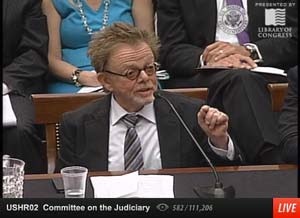

ASCAP’s Paul Williams speaks at the subcommittee hearing
After two hearings with a House Judiciary subcommittee, various music industry and digital industry leaders are still at an impasse on how to solve a complex and mangled licensing system, according to a recap from the New York Times.
In a second hearing on Wednesday (June 25), nine witnesses, including singer-songwriter Rosanne Cash, ASCAP’s Paul Williams, RIAA’s Cary Sherman, independent label Secretly Group’s Darius Van Arman and other record label executives discussed the various shortcomings and benefits of the current complicated set of rules governing publishers, radio and royalties. This follows an initial hearing held on June 10.
The most heatedly debated topic was AM/FM radio stations’ exemption under United States law from paying performers and record companies royalties. Radio stations pay songwriters, but do not pay for the recordings they play. The law has been increasingly challenged since the introduction of internet and satellite radio, which pay royalties to both songwriters and to performers and record companies. Cash, Sherman, Van Arman and others insisted that radio stations be required to pay this performance royalty.
Meanwhile, National Association of Broadcasters joint board chairman Charles M. Warfield, Jr., defended the current practice, stating, “Our unique system of free airplay for free promotion has served both the broadcasting and recording industry well for decades.”
Another issue that arose during the hearing is the lack of copyright protection for recordings made before Feb. 15, 1972. Under this law, older performers do not get royalties from digital services including Pandora and Sirius XM. Cash, daughter of late Country icon Johnny Cash, called the system unfair to older performers.
“If my father were alive today, he would receive no payment for digital performances of his song ‘I Walk the Line,’ written and recorded in 1956,” Rosanne Cash said. “But anyone who rerecorded that song today would receive a royalty. The injustice defies description.”
Cash also revealed how low streaming income has affected her own career. “For example, for an 18-month period, there were nearly 600,000 streams of my songs on a popular subscription site. I was paid $114.00 for those streams. I am not a lawyer or a politician or a policy wonk, and I couldn’t begin to parse the incredibly complex, outdated, pre-Internet laws regarding licensing and copyrights but I can tell you that I see young musicians give up their dreams every single day because they cannot make a living, they cannot survive doing the thing they most love, the thing they just might be on the planet to do.” Cash’s full testimony can be read here.
ASCAP’s Williams spoke in favor of changing the 73-year-old consent decrees that govern ASCAP and its performing rights organization rival BMI, stating the decrees hinder negotiations with digital services, and result in low rates for songwriters.
“I find it beyond perplexing,” Williams said, “that American songwriters like Rosanne and myself are the ones subject to the heaviest government regulation.”
This month, the Justice Department said it would review ASCAP’s and BMI’s consent decrees for possible changes. Williams outlined three specific updates for the DOJ to consider, including replacing the rate court with a faster, less expensive dispute resolution process. Another update involved allowing PROs to accept a partial grant of rights from its members, which means the organizations could license certain uses while the rights holders handle others directly. A final suggestion would permit PROs to offer all the rights in a music composition a licensee needs to operate their business, which ASCAP says competitors are free to do.
Williams added, “We need a music licensing system that works the way we will be, not— to paraphrase a great songwriter and friend—the way we were.”
Some battle lines were not clearly drawn. Though satellite radio company Sirius XM opposes music industry groups that seek royalties for songs recorded before 1972, they offered no solution. When asked how to resolve the disparity in performance rights for recordings (broadcast radio does not pay them, while satellite radio does), the company’s Sirius XM’s CFO David J. Frear stated, “Everyone should get paid.”
When asked by legislators how they would fix the system, the assembled execs did not offer a solution that would satisfy all parties.
“Getting you all together, and getting on one page,” Wisconsin Republican representative Jim Sensenbrenner said, “will probably happen two days after the sun rises in the west.”

Category: Featured, Financial/Legal
About the Author
Jessica Nicholson serves as the Managing Editor for MusicRow magazine. Her previous music journalism experience includes work with Country Weekly magazine and Contemporary Christian Music (CCM) magazine. She holds a BBA degree in Music Business and Marketing from Belmont University. She welcomes your feedback at jnicholson@musicrow.com.View Author Profile


